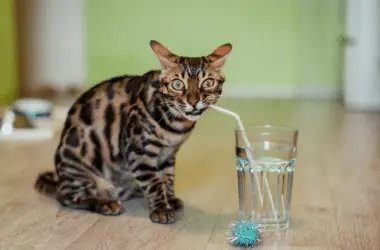Introduction
Welcome to the world of feline care, where “Sugar Water for Cats” emerges as a safe elixir for dehydration and upset stomachs. In this concise guide, we unlock the secrets behind using sugar water as a natural remedy for your cat’s well-being. Discover effective rehydration techniques, dispel common myths, and explore the benefits of this simple yet powerful solution.
Let’s delve into the realm of feline health, where a spoonful of sugar may indeed help your beloved cat stay happy and hydrated.

Table of Contents
II. Rehydration Techniques
A. How to Rehydrate a Cat Effectively
Dehydration in cats can occur due to various reasons, from illness to environmental factors. To address this, understanding how to rehydrate your cat effectively is crucial. Offering small, frequent sips of water and providing moisture-rich food can encourage gradual hydration. Additionally, consider using a veterinarian-approved electrolyte solution to replenish essential nutrients lost during dehydration.
B. Determining Optimal Water Amounts for Rehydration
When it comes to rehydrating your cat, it’s important to consider factors such as their weight, age, and health conditions. As a rule of thumb, it is recommended to offer around 1 ounce of water for every pound of body weight per day. However, it’s important to note that individual cats may have needs. It’s crucial to monitor their water intake and make adjustments accordingly.
C. Managing Dehydration in Cats
Recognizing the signs of dehydration is crucial for prompt intervention. Symptoms such as lethargy, sunken eyes, and dry gums may indicate dehydration. In addition to providing water, consider moistening your cat’s food or offering wet cat food to increase fluid intake. If dehydration persists or worsens, consult with a veterinarian promptly to rule out underlying health issues.
This section equips cat owners with practical insights into rehydration techniques, ensuring a proactive approach to maintaining their feline companion’s optimal health.
III. Understanding Sugar for Cats
A. Examining the Safety of Sugar for Felines
Sugar, often associated with indulgence, raises questions about its safety for cats. Contrary to common belief, in controlled amounts, sugar can be safe for feline consumption. Cats lack taste receptors for sweetness, making them less inclined to crave sugary treats. However, moderation is key, and understanding safe quantities ensures that sugar remains a viable option for certain health applications.
B. Dispelling Myths Regarding Cats and Sugary Treats
Misconceptions about cats indulging in ice cream and doughnuts abound, but the reality is far from such human-centric desires. Cats lack the biological predisposition to crave sweet foods. Debunking these myths emphasizes the importance of distinguishing between harmful sugary indulgences and controlled, purposeful sugar use in specific situations.
C. Assessing Risks Associated with Sugar
While sugar can be safe in moderation, it’s essential to recognize potential risks. Excessive sugar intake may contribute to obesity and dental issues in cats. Monitoring their overall diet and being mindful of added sugars in commercial cat treats is crucial. In the context of sugar water as a remedy, understanding the fine line between beneficial use and potential risks ensures responsible and informed care for your cat.
This section sheds light on the role of sugar in a cat’s diet, emphasizing the importance of moderation and dispelling common misconceptions. A nuanced understanding enables cat owners to make informed decisions regarding sugar intake for their feline friends.
IV. Sugar Water for Specific Conditions
A. Crafting Sugar Water for Cats with Diarrhea
When faced with a cat experiencing diarrhea, sugar water can serve as a gentle remedy. The solution involves creating a diluted mixture of sugar and water to help restore electrolyte balance and encourage hydration. It’s essential to consult with a veterinarian before administering sugar water, as they can provide guidance on appropriate ratios and frequency based on the cat’s specific condition.
B. Identifying Instances to Seek Veterinary Assistance
While sugar water can offer relief in certain situations, it’s crucial to recognize when professional veterinary assistance is necessary. Persistent or severe diarrhea may indicate an underlying health issue that requires expert diagnosis and treatment. This section guides cat owners in distinguishing between cases where home remedies are appropriate and instances that demand prompt veterinary attention.
C. Utilizing Sugar Water as a Natural Remedy
Sugar water serves as a natural remedy for various health concerns in cats. Beyond diarrhea, it can be beneficial for cats experiencing mild dehydration or upset stomachs. Understanding the appropriate circumstances for employing sugar water empowers cat owners to take proactive steps in promoting their cat’s well-being. However, it’s vital to approach such remedies with caution and seek professional advice when needed.
This section provides practical insights into the application of sugar water for specific feline conditions, outlining the steps to craft a suitable solution and emphasizing the importance of discerning when veterinary intervention is warranted.
V. Preparation and Administration
A. Step-by-Step Guide: Making Sugar Water for Cats
Creating sugar water for cats involves a simple yet precise process. Start by boiling water to ensure its purity, then allow it to cool. Once cooled, add a measured amount of sugar, typically a teaspoon per cup of water. Stir until the sugar dissolves completely. The result is a mild, sugar-infused solution ready for administration. This step-by-step guide ensures accuracy and safety in preparing sugar water for your cat.
B. Techniques for Administering Sugar Water
Administering sugar water to a cat may require some finesse. Use a syringe or a dropper to deliver small amounts directly into the cat’s mouth, ensuring a controlled and stress-free process. Alternatively, mix the sugar water with their regular water or wet food to encourage voluntary consumption. Tailoring the approach to your cat’s preferences ensures a smoother experience for both caregiver and feline.
C. Encouraging Cats to Drink Water
Apart from direct administration, encouraging cats to drink water voluntarily is essential for overall hydration. Introduce water gradually, consider using a cat fountain to pique their interest, and ensure the water is fresh and appealing. Combining these efforts with occasional sugar water administration can contribute to maintaining your cat’s hydration levels effectively.
This section equips cat owners with practical guidance on preparing sugar water, administering it with minimal stress, and fostering a regular drinking habit in their feline companions. Implementing these techniques ensures a holistic approach to maintaining optimal hydration in cats.
VI. Veterinary Consultation
A. Recognizing Signs for Vet Consultation
While home remedies like sugar water can be beneficial, it’s crucial to recognize signs that warrant professional veterinary consultation. Persistent symptoms such as prolonged lethargy, severe dehydration, or any unusual behavior should prompt immediate attention. Timely recognition of these signs ensures that underlying health issues are addressed promptly and effectively.
B. Balancing Home Remedies with Professional Advice
The use of sugar water as a home remedy should complement, not replace, veterinary care. Regular check-ups with a veterinarian provide a comprehensive overview of your cat’s health and allow for early detection of potential issues. Communicate openly with your vet about any home remedies, including sugar water, to ensure a holistic and well-informed approach to your cat’s well-being.This section emphasizes the importance of vigilant observation and proactive communication with a veterinarian. While home remedies can offer relief, they should be part of a broader strategy that includes professional guidance. Recognizing the boundaries between home care and veterinary intervention ensures the best possible care for your feline friend.
VII. Benefits and Risks
A. Positive Impact of Sugar Water on Sick Cats
Sugar water, when used judiciously, can have several positive effects on sick cats. It serves as a source of readily available energy, aiding cats in regaining strength during recovery. The mild sweetness can also make the water more palatable, encouraging cats to consume more fluids. Additionally, the electrolytes in sugar water can help restore the cat’s fluid balance, especially in cases of mild dehydration.
B. Potential Risks and Necessary Precautions
While sugar water offers benefits, it’s crucial to be aware of potential risks. Excessive sugar intake can lead to obesity and other health issues. Therefore, moderation is key. Always adhere to recommended ratios when preparing sugar water and avoid prolonged or frequent use without veterinary guidance. Monitoring your cat’s overall diet is essential to preventing unintended health consequences.
C. Finding a Balance for Feline Health
Balancing the benefits and risks of sugar water involves understanding your cat’s specific health needs. Sometimes, when the advantages are greater than the drawbacks, like when recovering from an illness or mild dehydration, using sugar water can be helpful. However, it’s important to take an approach and consider factors related to your cat’s diet and overall health to ensure their long term well being.
This section provides a nuanced exploration of the benefits and risks associated with using sugar water for cats. By understanding the potential positive impact and taking the necessary precautions, cat owners can make informed decisions that contribute to their cat’s health and recovery.
VIII. Frequently Asked Questions
1. Can honey be used as a substitute for sugar in cat remedies?
While honey shares some properties with sugar, it’s essential to exercise caution. Honey may contain bacteria harmful to cats, posing a risk of botulism. It is advisable to consult with a veterinarian before considering honey as an alternative.
2. How long can I give my cat sugar water, and how often?
The duration and frequency depend on the specific condition and the veterinarian’s guidance. Typically, sugar water is administered for a short duration, and the frequency is adjusted based on the cat’s response to treatment.
3. Can kittens have sugar water, and are there any age-related considerations?
While adult cats may tolerate sugar water, caution is warranted with kittens. Consult a veterinarian before administering sugar water to kittens, taking into account their age, weight, and overall health.
4. Is it necessary to boil water before making sugar water for cats?
Boiling water ensures its purity, eliminating potential contaminants. It’s recommended to boil water before preparing sugar water to enhance the safety of the remedy.
5. Is sugar water a proven home remedy for cats, and how effective is it?
While sugar water has shown effectiveness in certain situations, its efficacy may vary. Regular monitoring of the cat’s response, coupled with veterinary advice, helps evaluate the remedy’s effectiveness and make informed decisions regarding continued use.
This section addresses common queries surrounding the use of sugar water for cats, providing concise and informative answers to ensure cat owners have a comprehensive understanding of this home remedy.
Conclusion
In conclusion, “Sugar Water for Cats” emerges as a valuable and safe tool for addressing dehydration and upset stomachs in our feline companions. This guide has illuminated effective rehydration techniques, clarified the role of sugar in a cat’s diet, and explored the specific applications of sugar water for various conditions. Understanding the benefits and risks, along with practical considerations like preparation and administration, empowers cat owners to make informed decisions for their cat’s health.
While sugar water serves as a beneficial home remedy, it is crucial to strike a balance with professional veterinary care and to be vigilant about potential risks. By adhering to recommended guidelines, cat owners can contribute to their pet’s well-being and ensure a happy, hydrated, and healthy feline friend.



Great information 😁